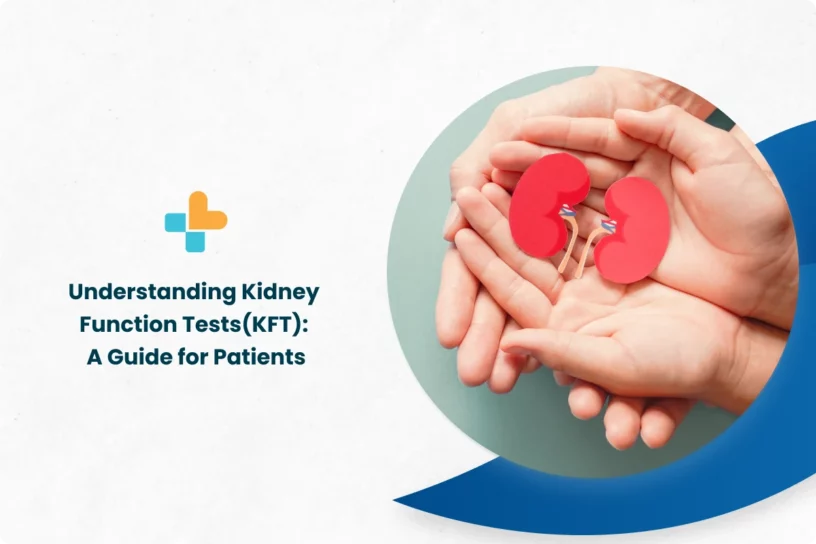Introduction
Kidneys are a vital part of the urinary system, responsible for filtering wastes out of the body. Additionally, kidneys play an important role in producing red blood cells, vitamin D, and hormones to maintain blood pressure levels. Chronic kidney diseases are extremely common and can cause significant harm to the kidneys. Kidney function tests are essential to check how efficiently the kidneys are working.
Let’s dive in to learn more about kidney function tests
What are kidney function tests?
Kidney function tests include urine or blood tests performed to determine the functioning of the kidneys. To comprehensively understand how well the kidneys are functioning, the doctor may order a combination of these tests at a time.
Why might you need a kidney function test?
There are certain conditions that can affect the kidneys and their functioning. Some of these conditions include the following,
- High blood pressure
- Diabetes
- Heart diseases
- Polycystic kidney disease
- Having glomerulonephritis
- Any infection in the kidneys
- Having kidney stones
You might need a kidney function test if you have any of these conditions.
Symptoms of kidney problems?
A kidney function test may also be prescribed if you notice symptoms that may be a sign of kidney problems. These symptoms may include the following,
- Blood in the urine or hematuria
- Frequent need to pee or urinate
- Pain while urinating
- Swollen hands and feet due to fluid build-up
- Trouble in starting urination
Various types of Kidney function Tests
Your doctor will order different types of kidney function tests to check the functioning of your kidneys. These tests include the following,
- Urinalysis
A urinalysis is a test that checks for protein and blood in the urine. The presence of protein can indicate various conditions, not all of which are necessarily harmful. For example, an infection can cause an increase in urine protein, as well as a vigorous workout. If your doctor suspects a problem, they may ask you to repeat the test after a few weeks to compare the results.
- Checking for microalbuminuria
The microalbuminuria test measures the amount of albumin in the urine. Albumin is an important protein in the blood, and excessive amounts of albumin in the urine indicate improper kidney functioning. Microalbuminuria test can measure even the smallest amounts of proteins present in the urine.
- ACR
Urine albumin to creatinine ratio (ACR) is a test that is used to measure the amount of albumin present in the urine. An abnormally high level of the protein albumin in the blood can be an indication of kidney problems. ACR test is useful in identifying kidney problems that can arise due to diabetes. An ACR result of less than 30 is normal.
- Creatinine Clearance
In a creatine clearance test, both blood and urine samples are checked to see how efficiently the kidneys are working to filter out creatinine from the blood for its excretion through urine. In this test, the creatinine present in the urine and blood samples are compared to see the amount of waste that is being filtered by the kidneys. The normal value for men is 97 to 137 mL/min and for women is 88 to 128 mL/min.
- Serum creatinine test
Creatinine is a type of waste product that is produced when the muscle tissue breaks down. The kidneys are responsible for filtering creatinine out completely from the blood. The serum creatinine test looks for the build-up of creatinine in the blood. This is because a build-up of creatinine in the blood is an indication of a kidney problem.
The test result showing a creatinine level of more than 1.2 in women and more than 1.4 in men is an indication of improper kidney functioning.
- Blood urea nitrogen (BUN)
A blood urea nitrogen (BUN) test is performed to measure the amount of nitrogen in the patient’s blood. Nitrogen is formed as a result of breakdown of protein. It is essential to inform your doctor about any medications or supplements you are taking, as certain medications can increase the blood urea nitrogen. The test result showing a value between 7 to 20 mg/dL is the normal Blood urea nitrogen (BUN) level.
- Glomerular Filtration Rate (GFR)
The glomerular filtration rate checks how efficiently the kidneys filter out waste. The filtration rate is calculated based on factors like the patient’s age, gender, weight, and height. The normal test result, according to the National Kidney Foundation, ranges between 90 to 120 mL/min/1.73 m2.
How are the tests performed?
Kidney function tests are typically performed by taking a blood test and a 24-hour urine sample test.
For blood tests:
For blood tests like Blood urea nitrogen (BUN) and the serum creatinine test, the doctor or lab technician will collect the blood sample from the patient. To collect the blood sample, an elastic band will be tied around the patient’s upper arm to make the vein more visible. The technician will then clean the area and withdraw the blood. The blood sample will then be sent for analysis.
For a 24-hour urine sample
To perform a 24-hour urine test, your doctor or lab technician will give you a sample-collecting container. On the day you are supposed to take the test, you should urinate into the toilet like you normally do when after waking up. Then throughout the day, you should keep collecting your urine in the container. On the second day, you should begin by urinating in the container in the morning. Once you’ve collected all the urine for the 24-hour period, you can send the sample container to the laboratory or doctor’s clinic to complete the test.
What if you have kidney disease?
Upon receiving results that show problems with the kidneys, your doctor will provide you with the right treatment plan and regular tests to check the functioning of the kidneys and your overall health.
Conclusion
Kidneys play a vital role in maintaining overall body health. Various diseases can have an effect on the kidneys. The kidney function tests help the doctor learn more about the kidney and its health. These tests help identify the problems in the kidneys, which in turn helps diagnose the root cause behind kidney problems and treat it on time.
At Ayu Health, we provide various tests to identify kidney problems. Our team of experts helps patients by diagnosing the condition on time and providing the best treatment plan. All of our treatment plans and services are highly affordable and easily accessible.
Our Hospital Locations
Urology Surgery Hospitals in Chandigarh | Urology Surgery Hospitals in Bangalore | Urology Surgery Hospitals in Jaipur | Urology Surgery Hospitals in NCR | Urology Surgery Hospitals in Hyderabad
Our Doctors
Urology Surgery Doctors in Chandigarh | Urology Surgery Doctors in Bangalore | Urology Surgery Doctors in Jaipur | Urology Surgery Doctors in NCR | Urology Surgery Doctors in Hyderabad
About the Author

Dr. S. Goel
Dr. S. Goel is a renowned Internal Medicine Specialist currently practicing at Ayu Health, Bangalore. He is a Specialist in Internal Medicine, Diabetes HTN, Paediatric Care, and Family Medicine.




